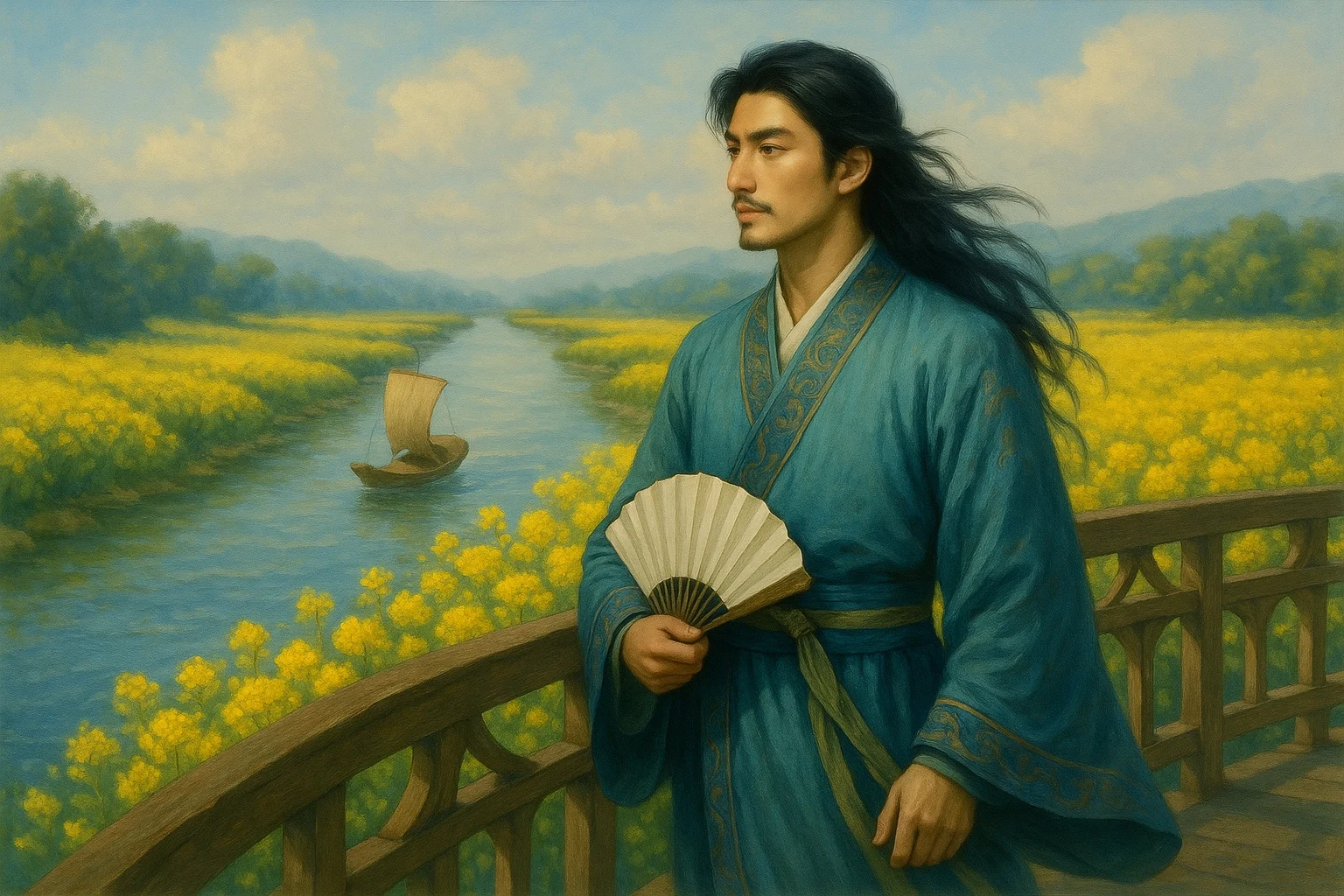A distant mission begins, long prepared—
farewell wine was poured just yesterday.
Your gate lies deep where autumn trees age,
your road emerges with the evening tide.
In Jianli, scholars of renown abound;
the southeast breeds its finest minds.
One day, when duties give you rest,
may you still recall this branch I’ve planted.
Original Poem
「送张员外赴江西」
崔峒
远使经年发,离尊昨日开。
门深秋树老,路出晚潮来。
建礼多名士,东南有秀才。
他时从政暇,应念一枝栽。
Interpretation
Composed during the mid-to-late Tang Dynasty when social turbulence increasingly strained scholar-officials' careers, Cui Dong's poem exemplifies his characteristically serene and refined style. Written upon his friend Attendant Zhang's departure for a new post in Jiangxi, this regulated verse conveys not only parting sorrow but also profound encouragement - a literati farewell that transcends mere sentimentality to articulate shared ideals, official aspirations, and personal integrity. With concise yet suggestive language and understated sincerity, the poem showcases Cui Dong's poetic mastery and humanistic spirit as one of the "Ten Great Talents of the Dali Era."
First Couplet: "远使经年发,离尊昨日开。"
Yuǎn shǐ jīng nián fā, lí zūn zuó rì kāi.
This distant mission, planned for many a year;
Our parting cups were emptied yesterday.
The opening couplet immediately addresses the journey's significance. "Distant mission" (远使) suggests both geographical separation and long-term importance, while "emptied yesterday" (昨日开) emphasizes the poignant immediacy of departure. The juxtaposition of "many a year" (经年) with "yesterday" highlights the poet's acute temporal awareness and intensifies the farewell's emotional weight.
Second Couplet: "门深秋树老,路出晚潮来。"
Mén shēn qiū shù lǎo, lù chū wǎn cháo lái.
Before deep gates, autumn trees stand aged and bare;
Your road emerges where evening tides appear.
This couplet paints a melancholic farewell scene. "Deep gates" (门深) and "aged trees" (树老) create an atmosphere of secluded solemnity, while "evening tides" (晚潮) symbolize both nature's rhythms and surging emotions. The autumnal imagery, with its muted palette of greys and blues, forms a classic parting tableau that speaks to life's transience.
Third Couplet: "建礼多名士,东南有秀才。"
Jiàn lǐ duō míng shì, dōng nán yǒu xiù cái.
Jianli teems with distinguished minds;
The southeast breeds talents most refined.
The tone shifts to affirmation and expectation. "Jianli" (建礼), originally the Tang Imperial Academy's location, here represents centers of intellectual excellence. By highlighting the destination's scholarly reputation, the poet subtly praises his friend's worthiness to join such company, blending humility with quiet confidence in Zhang's abilities.
Fourth Couplet: "他时从政暇,应念一枝栽。"
Tā shí cóng zhèng xiá, yīng niàn yī zhī zāi.
When from your duties you find release,
Recall this humble branch's silent grace.
The conclusion lingers with graceful subtlety. "Find release" (从政暇) envisions future success, while "humble branch" (一枝栽) employs garden imagery to represent the poet's modest but nurturing influence. This final note - at once a tender reminder of shared history and a dignified affirmation of enduring connection - reveals the poem's profound humanity and the refined emotional restraint characteristic of Tang literati culture.
Holistic Appreciation
This eight-line classical regulated verse encapsulates the melancholy and hope of parting. The emotions unfold progressively—from the immediate scene of farewell to the poet's admiration for his friend's character and future prospects, then settling into a quiet whisper of personal sentiment. Set against the backdrop of autumn tides at dusk, Cui Dong employs scene-setting to convey emotion, blending the tangible with the intangible, where friendship and life's journey, reality and aspiration, merge seamlessly. The poem's concise diction brims with profound feeling, flowing like endless autumn waters that reveal both the pain of separation and an undercurrent of refined sentiment. More than a farewell poem, it is a microcosm of life's undulations and emotional tides.
Artistic Merits
The poem's emotional structure follows a deliberate progression from the concrete to the abstract, the surface to the depths. The opening couplet depicts the immediacy of parting; the second embeds emotion within the landscape; the third expresses praise and hope; while the closing lines gently gather these threads into a tender resolution. Linguistically, Cui Dong maintains his signature understated elegance, using imagery like "deep gates," "aged trees," and "incoming tides" to craft a serene yet profound atmosphere of separation. Its greatest strength lies in its restrained power—though brief, each couplet is distilled and resonant, epitomizing the Mid-Tang aesthetic of "revealing strength within sparse tranquility."
Insights
This poem teaches us that true friendship resides not only in the warmth of shared moments but also in the unspoken remembrance that endures beyond them. Life's meetings and partings, like the poem's "yesterday's farewell cup," may be fleeting yet unforgettable, while "planting a branch" symbolizes selfless care rooted deep in the heart. In our own lives, regardless of circumstance, we should emulate Cui Dong—not merely bidding farewell to friends, but offering our deepest well-wishes and respect. It shows us how to convey profound meaning through simplicity, to preserve warmth in separation, and reminds us to cherish those who quietly "plant branches" for us along life's path.
About the Poet

Cui Dong (崔峒, dates of birth and death unknown), a Tang Dynasty poet from Anping, Hebei, was active during the Dali era (766 - 779). Along with Sikong Shu, Lu Lun and others, he was known as one of the "Ten Talents of Dali." His poetry primarily consists of five-character regulated verse (wulü), characterized by an elegant and subtle style. The Complete Tang Poems preserves 48 of his works. His poetic style resembles Liu Changqing's but appears more solitary and austere, reflecting the transition from the vigorous grandeur of High Tang poetry to the introspective quality of Dali-era verse.












